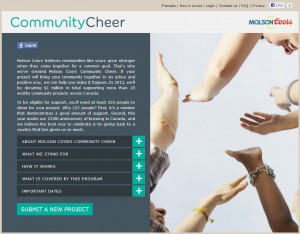In response to Anastasyia’s blog post
I found this strategy very interesting. The best marketing campaigns sell not just a trivial product, but an entire lifestyle. That’s obviously what Molson is striving to achieve, but one wonders if selling an ideal that does not include your product is in fact productive. Obviously those with healthy lifestyles will in fact enjoy the cool, refreshing taste of a quality beer, and probably switch to Molson after that because it’s cheaper, but these are exceptions, flaws in an otherwise wholesome program.
Grassroots marketing is a good idea because a company can then take another angle in the market. However, I am curious to find out how successful it actually is. Understandably, it improves a brands image, and puts them on a the ‘socially responsible’ map-but realistically does Molson sell more at the end of the day? Does seeing Molson programs supporting community healthy lifestyle increase profits? I know that as a consumer that might not necessarily go out an buy that product, what I would do is talk about it, thus promoting the product for free.

